- Home
- Jane Arbor
Return to Silbersee Page 8
Return to Silbersee Read online
Page 8
But of course it hadn't been, and she couldn't afford to fantasise on the sweetness of a moment which, he admitted, had spelled nothing to him but an opportunity to be taken. And if lingering on the might-have- been of his impulse was leading her into this nonsense of apathy towards their differences, it had to stop. Instead she was going to remember how he had dared to put her under obligation to him, probably relishing a sense of power in doing it. She wasn't going to deny the possibility that he had enlisted Ilse as his deputy gadfly, and she was going to convince herself that the pull of his attraction for her was merely physical—a magnet of mere looks and voice and touch, and she had character enough to resist that—hadn't she?
Sooner than she expected, her resolve was given a fillip by an incident of a few days later, when she was to be utterly confounded by two of her workers being accused as common trespassers and thieves in the forest they had been free to range at will for years.
The two were brothers—Edmund and blind Helmut Jager, the latter's speciality being carved animals, fashioned by the seeing eye of his skilled hands and tools out of the wood he tracked down for himself from instinct and touch and even smell, and which he was used to finding among the inevitable jetsam of the forest floor.
Edmund always went along as his guide on these forays; when no fallen log or tree-feller's rubbish took his fancy, they would mark a standing tree of birch or alder or pine; the School would put in a tender for it, and if a price were agreed, the forest-ranger would authorise its felling and sale. Much of the timber the School used was obtained so; regular parties reconnoitred the woods for their raw material—lime and beech and birch and cherry—and hitherto, even in Grandpa Weisskop's long memory, no one had ever barred their way.
But Edmund and Helmut, searching in the area leased by Adler Classics, had been apprehended and warned off by Karl's felling foreman. Aggrieved and dismayed, the brothers brought their dilemma to Juliet. Never before had they been accused of trespass, never before forbidden to glean the scrap timber they needed. What was more, much of the beech and maple which the School used in bulk grew in that area. Were they not to be allowed to mark it down for purchase as they had always done?
As indignant as everyone else, in all justice Juliet had to point out that the standing timber no longer belonged to the Baronin, and Adler Classics had a right to choose its customers. The foreman must have been acting within his orders, but though there was no doubt as to who had given them, the accusation of trespass for mere gleanings, that was not to be borne!
She soothed Edmund and Helmut as best she could and telephoned the Baronin, who was sympathetic but was powerless to take sides, pointing out that the timber was no longer hers to sell or to withhold. And as for trespass, the law on that wasn't too well defined, was it, she appealed.
'In England, damage to property has ta be proved,' Juliet pointed out.
'Here too, I expect, dear. But your man of business could advise you. Or would you like to consult mine?'
'I'd prefer to tackle Karl Adler first. Would you ask him to come to see me, Magda, the next time he is over? If he has a case against us, I'd like to hear it, and to put ours,' said Juliet. She had known Magda couldn't help, but she had needed a listener for her rancour, and she had Magda's promise to act as her messenger to Karl. Before they had rung off Magda had urged, 'Try not to antagonise him, Julie. I'm sure he likes you and wants to make a friend of you.' To which Juliet had replied non-committally. With Karl Adler as a friend, who needed enemies? she had been tempted to ask.
Without warning her of his arrival he came down to the School a few days later. At the time, she and Wilhelm were out in the stockroom at the far end of the building, checking a consignment of varnishes, sandpapers and solders which had just been delivered. When she came through to the main workshop he was there, oblivious of her approach, so intent was he at— of all places!—Helmut's bench, watching Helmut at work on a larchwood crocodile, scaly and grained, and taking its final polish. Nearby on the bench was a 'woolly' sheep, awaiting the insertion of its ears, a menacing bull, a haughty llama and in Karl's hand a dozing cat, neat and collected, paws folded under.
He continued to talk to Helmut, and Juliet, conscious of her dungarees and a shirt stained with linseed oil from a defective can, deplored the prospect of an interview thrust upon her at such little notice that she hadn't rehearsed it and knew she was looking like a garage hand who had just eased out from under a car.
But there was no escape. Other people" had noticed her, and Karl was turning. He put down the cat, offering his hand. She didn't care at all for the glint of challenge in the blue eyes, nor for having to wipe her own hand on the hip of her dungarees before she could decendy take his.
His smile was audacious, assured. 'You wanted to see me? Shall we talk?' he asked.
'Yes, but not here.'
'And not, I hope, until I've accepted an invitation to see your people at work, which I don't seem to remember you've issued?'
'I'm sorry, I hadn't realised you'd be interested,' Juliet said stiffly.
'Surely? On a broader scale, I'm in the same line, aren't I? Do you sell any of your stuff on the premises?'
'To any visitors who want to buy, yes.'
'Good.' Karl turned to touch Helmut on the shoulder. 'I like your cat,' he said. 'How much is she?'
It was Juliet who told him and he laid the appropriate notes on Helmut's bench, then moved on to the next to handle and ask questions and appraise, reminding Juliet inevitably of Royalty on an industrial tour, gracious and interested and welcomed.
Which latter, in his case, was odd. Everyone knew ' him and the threat he embodied; some of her workers probably guessed why he was there. Yet there wasn't one of them who didn't seem to warm to his attention, basking in his respect for skill, telling him all he wanted to know.
Going over to the enemy, were they? Juliet watched and listened jealously, though only too conscious of the times when she hadn't been proof against his charm herself. Even now ... even now, moving at his side, hearing his voice, she was acutely and vividly aware of her exposure to him, as to the peril of a flame from which she ought to step back and could riot. If she couldn't resist him, how could she expect them to? But they ought to, and so ought she. And meant to!
He brought his cat with him when he went through with her into the house. Fitting the cat's smooth contour into his palm, he commented, 'Deceptively cosy- looking creature, isn't she? Eyes closed, claws sheathed. Pounce upon a victim? Nothing further from her mind!' He paused, frowning in a perplexity which couldn't be genuine. 'Reminds me of someone. Now who?'
Juliet said, 'I'm sure you know whom you mean, and you intend that I should. So let's leave it there, may we?'
He shrugged. 'But of course.' The cat went into his pocket and he sauntered over to a side-table to take up a wooden fruit bowl, as smooth as glass, its delicate grain a shimmer beneath its surface.
'What's the wood?' he asked.
'Ash.'
'Nice work. Whose?'
'Mine,' she said. And then levelly, 'The last thing I did under Gerhard's tuition.'
Karl nodded. 'He trained you well. You've gone on doing other things since?'
'No. I could never be more than an amateur. Now I work for professionals. I'm not one of them. I'm simply the manager here, as you know.'
Another nod. 'Managing some things, it seems, beyond your terms of office. I understand you take strong ' exception to my daring to guard my own property from possible marauders? Is that so?'
'Marauders! A blind man with his brother as guide, in search of your timbermen's leavings!'
'They were still trespassing.'
'Stricdy, I suppose, yes. But by a right they've -always had.'
'What right?'
Juliet shrugged. 'Habit, custom, usage. Or, if you like, Baron von Boden's blessing, which the Baronin has carried on.'
'Without its following that I need grant you the same freedoms.'
'Oh, you n
eed not!' she scorned.
'And supposing I made an exception for your blind worker, what about the others? Do they also expect to roam the forest and make their selection of my timbers at will?'
'All those who, like Helmut Jager, can tell by the way a piece of wood moulds to the hand how it will carve up and into what. They want to be able to choose their own, and for a blind man it's essential. As for their marking of suitable trees '
'Yes, that,' Karl cut in. 'We employ selection teams too, and what if their choice of a suitable timber for felling clashes with yours?'
'Then of course their right to it would override ours.'
He sketched an ironic bow. 'You are too generous!'
'Not but that our money was always considered good enough,' she snapped back. 'However, my reason for asking you to see me was to find out just how the School stands in this matter of trespass, and now I suppose I know. And of course shall bow to your ruling.'
'I'm glad of that,' he agreed blandly. 'Short of erecting fences around my area of timber, how otherwise than by your compliance could I keep you out?'
'And that's your last word, is it—that we stay out?'
'Such a hardship, is it, considering how many hectares of forest there are for your roaming, where I haven't leased the felling rights? And you must have other sources of supply of wood than your charity pickings at my expense?'
'Of course we have contracts with other merchants.'
'Exactly. Which makes me wonder whether your claim that your particular need is for the timbers we've leased isn't your idea of a justifiable harassment. It could be, perhaps?'
She stared. 'It's true that there's more beech and pine and walnut in that area than anywhere else on the slopes. But I've never made such a claim, to you!'
'No. I had it from the Baronin, pleading your case. Fair enough. But it doesn't do much for my suspicion that you could be using the fact as a form of blackmail inspired by your need for revenge.'
Juliet flared at that. 'How dare you?' she exploded, and without giving him a chance to reply, plunged on, 'And since we're being frank about our suspicions, What about mine—that your refusal of rights which the School has always enjoyed could well be your backdoor method of getting your way in the bigger issues at stake? Cut off our supplies at the root, hamper us in every way you can—in other words, a cold war that could be more successful than a hot one? Slower, but equally sure in the end. Am I right?'
'If you were, should I have enquired as to your other sources of supply?' he countered. 'But your thinking it at all shows that you've a flair for malice which is at least the match of your other talents. Which, if I may say so, are not inconsiderable.'
'Thank you. Do I take that as a compliment?'
'Take it as you please.'
'I will—as a backhanded one. And talking of malice, what about yours against us?' she retorted.
'You've no proof that I've shown any. Your cold war theory is so random that it's laughable.'
7 wasn't laughing.'
' 'Nor am I—at the gall which must have prompted it. But just to show that magnanimity is my middle name, I shall instruct my foreman that my authority for his ban on trespassers doesn't in future include your people on their gleaning forays. So now can you allow yourself to backpedal on "cold war"?'-
She couldn't accept this sudden change of front with any grace. She said, 'If your foreman was acting on your orders, please don't make a charity of excepting us.'
'Ach!' Karl's exclamation was exasperated and she shrank a little from the spark of anger in his eyes. 'And if it wasn't to coax such a charity from me, why did you want to see me?' he demanded.
'Coax'—what belittling words he chose! 'I've told you I only wanted to know where we stood. And I assure you I've no need to beg charity from you—or from your business friends.' She held his glance as she spoke and guessed from his slight nod that he had understood her.
'Oh, that ' he said. 'The Kleinmayer order?
Who told on me, then?'
'You told Magda von Boden that you had asked Herr Bezold to see me, didn't you? And I think you telephoned him before I called on him.'
Karl nodded again. 'Guilty.'
'And you didn't tell me what you'd done because you knew I should resent your meddling with my affairs?'
'Because I guessed—rightly, it seems—that you would let your sick silly pride get in the way of whatever grains of business acumen you may have. Just as, in this latest thing, you're prepared to go back to your people to report "Nothing doing" because you are a lot too stiff-necked to accept a gesture from me?'
Her chin went up. 'They'll understand.'
'Will they?' In a couple of strides he was standing over her, his hands clamped on her shoulders, almost shaking her. 'Understand the lie you will tell them— that my veto on their gleaning is absolute, or the truth that it's your petty conceit that they have to blame?'
'I shall tell them the truth, of course.'
'Such moral courage! The truth being ?'
She had reached a decision which surprised her. 'That—reluctantly—I've accepted your offer.'
'May they forgive you your reluctance! But—good.' He straightened, releasing her, then breathed a long sigh of mock despair. 'All these words and all this umbrage in the name of an inflated ego the size of a balloon! You know, Miss Harmon, if I hadn't the restraint of a Job, I could be sorely tempted to put over my arguments in ways you'd probably find quite unacceptable to your dignity.'
'Really?' She hoped she sounded detached. 'What kind of ways had you in mind?'
'Crude ones. Physical ones. Ways that get results equally in the nursery and the jungle.' He broke off, pointing a finger. 'The fruit bowl—is it for sale?'
She looked over at the bowl. 'No. Why do you ask?' she replied, her curiosity too much for her.
He shook his head. 'It doesn't matter—if I'm expected to make a good case of my reasons for considering buying it.'
She flushed at her gaucherie. 'I'm sorry, I shouldn't have asked.'
'You shouldn't. But you did, and as I'm not prepared to go into details, no sale—hm?'
'No sale,' she confirmed in a small voice, knowing that never again would she see or use the bowl without remembering the frost of this occasion. As usual, Karl had had the last word.
At the news that the School was to keep the freedom to range the forest Wilhelm Konstat commented a gratified 'Hmm', and it was only by a chance meeting in the village that Juliet learned the truth of the foreman's expulsion of Edmund and Helmut from Karl's land.
She had gone to the inn to order a case of cider for the School's snack counter, and the foreman, Hans Schreiber, whom she knew by sight, was enjoying his noonday Kognak at the bar. He greeted her by name, inviting her to join him, which she did, choosing a light Rhine wine at his offer.
They raised their glasses/Prosiif/' He asked her if all was now well in the matter of her 'comrades'' gleanings. She told him it was, thanks to Herr Adler's generosity, to which he replied surprisingly,
'Das ist gut. For I was to blame. I should have checked first with Herr Adler that I was to evict them on sight, instead of taking it from Frau Krantz that such was his ruling. But naturally I concluded that she knew. Who wouldn't?'
Juliet absorbed this only slowly. 'You are saying that you didn't act on direct orders from Herr Adler, but only on a message from him through Frau Krantz?' she asked.
Hans Schreiber nodded. 'So I believed at the time. After all, she is on the spot at the Schloss; he is not, and what more likely, I thought, than that she should be speaking for him?'
'Likely?' Juliet queried.
'Well, on their closeness, you understand?' The man's wink conveyed more than the words. 'But what do I find, when Herr Adler consults me? That she had
no such authority from him, and even tried to deny that she had led me to believe she had!'
'But Herr Adler didn't make you take the blame for the mistake?'
'Not he. As an em
ployer, he is iron. But he is just, and in this thing he exonerated me completely, and has since settled it with your comrades. Is it not so?'
Juliet agreed that it was, and when they parted a -little later, they did so amicably. But she was left with a contradiction of relief and jealous despair that was almost unbearable.
Relief that Karl hadn't, after all, ridden roughshod over the School's privileges for the sake of the pettiness of which she had accused him. And despair that she had no weapons to use against an Ilse Krantz who had the arrogance to speak for Karl, even if she had no right. What was more, he had had only to spike Juliet's own guns by disclaiming Use's orders to his foreman at the outset of her challenge to him.
But he hadn't done it. He had argued and defended his position as if it were his alone. Not by a word had he betrayed Use's part in it. Why not? There was only one answer to that, Juliet told herself. He was so much in thrall to Ilse that to shield her was more important than to make a case for himself. And Juliet's hatred of that thought was a jealousy of Use's power with him which nagged like a physical pain.

 High Master of Clere
High Master of Clere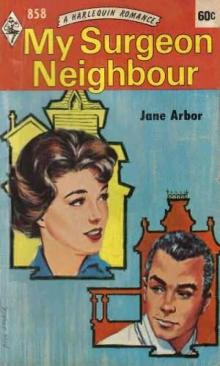 My Surgeon Neighbour
My Surgeon Neighbour Lake of Shadows
Lake of Shadows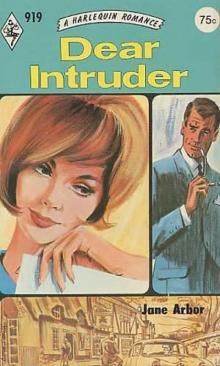 Dear Intruder
Dear Intruder Flash of Emerald
Flash of Emerald Return to Silbersee
Return to Silbersee Far Sanctuary
Far Sanctuary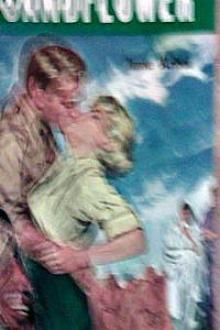 Sandflower
Sandflower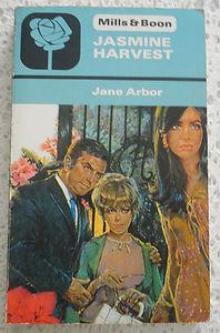 Jasmine Harvest
Jasmine Harvest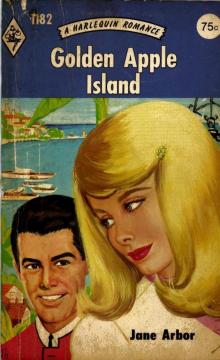 Golden Apple Island
Golden Apple Island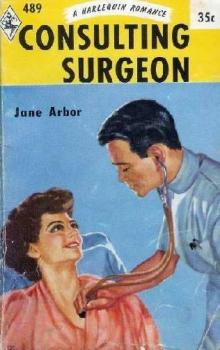 Consulting Surgeon
Consulting Surgeon Pact without desire
Pact without desire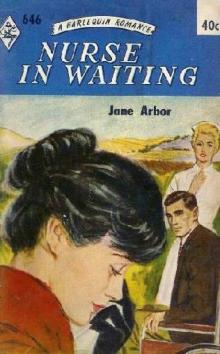 Nurse in Waiting
Nurse in Waiting Wildfire Quest
Wildfire Quest Roman Summer
Roman Summer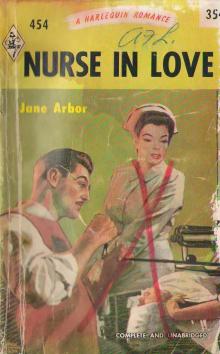 Nurse in Love
Nurse in Love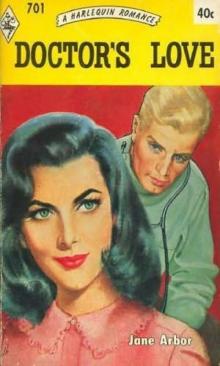 Doctor's Love
Doctor's Love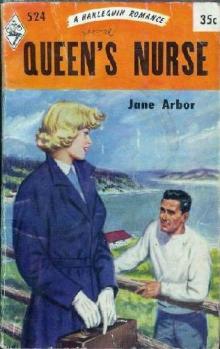 Queen's Nurse
Queen's Nurse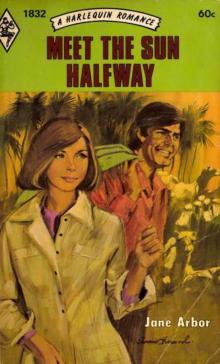 Meet the Sun Halfway
Meet the Sun Halfway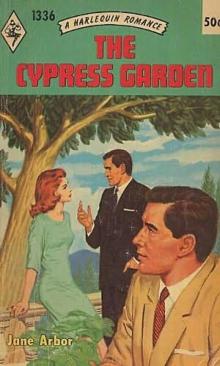 The Cypress Garden
The Cypress Garden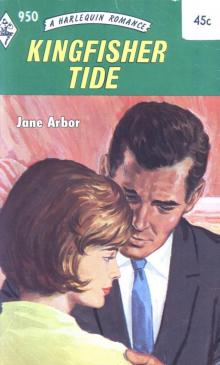 Kingfisher Tide
Kingfisher Tide A Growing Moon
A Growing Moon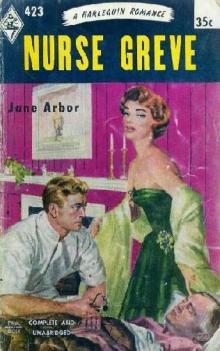 Nurse Greve
Nurse Greve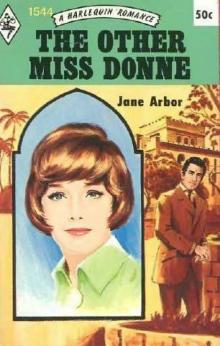 The Other Miss Donne
The Other Miss Donne